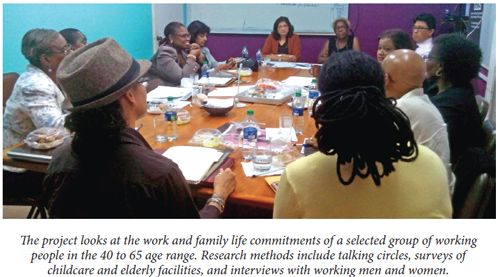
 At some point in life most if not all people will be troubled by certain fundamental questions. How do we find that elusive and fulfilling balance between work and life? How will we deal with old age, our own and our parents? Advancement and shifts in culture make these concerns even starker as traditional gender roles have changed and people live much longer. At some point in life most if not all people will be troubled by certain fundamental questions. How do we find that elusive and fulfilling balance between work and life? How will we deal with old age, our own and our parents? Advancement and shifts in culture make these concerns even starker as traditional gender roles have changed and people live much longer.
Ambitiously, a research team at the UWI St Augustine Campus has undertaken a project to not only collect the data on work/life balance and aging but also implement practical solutions for Caribbean society. In fact, the project has already begun this practical aspect through a lecture series for employees of one of Trinidad and Tobago’s public utility companies.
The research is titled Work/Life Balance and Ageing in Trinidad: Studying the Productivity and Wellbeing of Working Men and Women.
“Life has accelerated,” says Professor Patricia Mohammed, Lead Researcher of the Work/Life Balance and Ageing project. “And at the same time the expectation of life has increased. It is no longer three score and ten. The average person is living longer. By 2030 the population who would have retired at 65 will exceed the working population”.
The project looks at the work and family life commitments of a selected group of working people in the 40 to 65 age range. Research methods include talking circles, surveys of childcare and elderly facilities, and interviews with working men and women.
Professor Mohammed, who is also Professor of Gender and Cultural Studies as well as Campus Coordinator of the School of Graduate Studies and Research, explains that, “we approached this project with the belief that it should not just be an intellectual approach. It had to include the practice, the axiology between concept and practice”.
She reached out to the Social Work Unit in the Department of Behavioural Sciences to combine the practical methods of social work with the theoretical framework of gender studies.
“We are synergising gender and social work, using some of the philosophies of gender and the methodologies of social work,” says Dr Cheryl-Ann Boodram, Investigator with the project and Assistant Lecturer /Practicum Coordinator with the Social Work Unit. “We work together and find solutions”.
This multi-disciplinary, practical outcome type of research is very much in line with the larger research goals of the University of the West Indies. Seeking to encourage research of this nature, UWI St Augustine established the Research and Development Impact (RDI) Fund, which provides three-year funding for projects in specific thematic areas. The Work/Life project, which began in 2015 and will run to April 2018, is RDI funded.
The emphasis on impact is reflected in key facets of the project. The research team made sure to carry the work outside of the campus and establish partnerships with organisations such as the International Labour Organisation (ILO), the Trinidad and Tobago Association of Retired Persons (TTARP), the UN Economic Commission for Latin America and the Caribbean (UNECLAC), the Women’s Institute for Alternative Development (WINAD), Working Women, corporate sector representatives and even homes for the elderly.
The research team has also developed a work/life balance module that it is delivering to employees of one of Trinidad and Tobago’s public utilities, a massive organisation with over 13 stations throughout the two islands.
“It is an interactive lecture series,” says Dr Boodram. “We engage the workers to uncover how they construct their own meaning of work/life balance. We continue until we discover what causes them stress and then work together to find solutions to help them cope”.
The team has traveled to far-flung communities to deliver the module, providing relief to many.
“Everywhere we go the experience is different and new,” says Professor Mohammed.
But no matter the location, certain causes of work/life stress appear consistently. These include traffic to and from work, which eats up hours every day for working people; communications technology, which allows encroachment into time allotted to both work and life; evolving gender roles, particularly of women, who find themselves juggling work along with traditional roles such as homemaker and childcare; and caring for ageing parents, another emerging phenomenon as people live longer.
And the impact has been very positive, says Dr. Boodram: “The experience has been absolutely wonderful. People are animated in talking about their experiences. The sessions are full of anecdotal stories about the challenges they face. They feel engaged by us. Many have said that they are happy to be engaging with the university in a very meaningful way. When we do these sessions people see that they are not alone in dealing with stress. It brings them together, which in turn helps them find solutions”.
Coming out of the lectures there has been greater contentment and productivity within the organisation. The research team is looking at using the data related to work/life stress uncovered from the modules to provide policymakers and stakeholders vital qualitative information on the labour force. They also want to create a saleable module that can be used by other organisations.
Currently, the Work/Life Balance project is in the second of its three year span, but with the engaging nature of the research and its proven practical impact it seems certain that this is just the beginning.
 The Research Team: The Research Team:
- Professor Patricia Mohammed: Lead Researcher
- Professor Paula Morgan: Investigator and Advisor
- Dr Cheryl-Ann Boodram: Investigator
- Dr Angelique Nixon: Investigator
- Deborah McFee: Investigator
- Renée Maria Cozier: Research Assistant
- Sommer Hunte: Research Assistant
- Patricia Hackett: Research Assistant
- Rachel Taylor: Research Assistant (OJT)
- Raquel LM Sukhu: Project Manager
|





